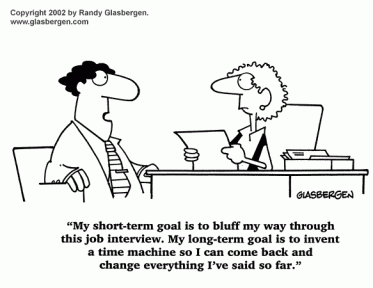 There’s a lot of blogs and articles that focus on recruitment, searching for the right employee, getting to know them, determining if they are a good fit, steering clear of not so kosher applicant’s and so forth… However, very little articles focus on tricks and tips the recruiter can use not only to be a better recruiter, but to actually make informed decisions.
There’s a lot of blogs and articles that focus on recruitment, searching for the right employee, getting to know them, determining if they are a good fit, steering clear of not so kosher applicant’s and so forth… However, very little articles focus on tricks and tips the recruiter can use not only to be a better recruiter, but to actually make informed decisions.
 Job recruitment is based on whether or not an applicant can complete the job description. This is determined by 3 things, education, experience, and WHO you have worked for. No doubt, that getting on with Bombardier looks better on your resume than Mom & Pop’s Coffee Shop. So why are there so many dysfunctional employees in an office, why is no work getting done? Because people lie. It’s plain and simple. People have a natural incline to want to be better than what they really are, after all, we are all struggling to get ahead. People lie about their education, work history, job titles, and oh so much more. Well, in an attempt to weed out the liars, psychometric testing was introduced. What a joke that is. It guarantees results with personality testing, education testing, and profile compilation- all by asking some questions on a computer screen. Something about this smells of lazy 4 day old tacos to me. You want a better example?- Check out how accurate eHarmony testing was. Yeah, that’s what I thought. Success rates are almost as high as a spider outrunning liquid chocolate at the factory. So in an attempt to help todays recruiter be a better recruiter, and draw out more information from their candidate than any CPU screen could do, check out these tips:
Job recruitment is based on whether or not an applicant can complete the job description. This is determined by 3 things, education, experience, and WHO you have worked for. No doubt, that getting on with Bombardier looks better on your resume than Mom & Pop’s Coffee Shop. So why are there so many dysfunctional employees in an office, why is no work getting done? Because people lie. It’s plain and simple. People have a natural incline to want to be better than what they really are, after all, we are all struggling to get ahead. People lie about their education, work history, job titles, and oh so much more. Well, in an attempt to weed out the liars, psychometric testing was introduced. What a joke that is. It guarantees results with personality testing, education testing, and profile compilation- all by asking some questions on a computer screen. Something about this smells of lazy 4 day old tacos to me. You want a better example?- Check out how accurate eHarmony testing was. Yeah, that’s what I thought. Success rates are almost as high as a spider outrunning liquid chocolate at the factory. So in an attempt to help todays recruiter be a better recruiter, and draw out more information from their candidate than any CPU screen could do, check out these tips:
1) Get Over Yourself. I have met a lot of men and women who think hiring and firing is all about being able to read people and determine whether or not they can do the job. Ultimately I find a lot of recruiters to be stuck up because the truth is, they have a lot of power- being able to determine your employment fate. So as a forewarning from an HR Strategist to the Recruiter, get over yourself. When candidates walk into the office and are more nervous than a shaved terrier, let me remind you that you could be the Hamburglar, and they will still be just as nervous. Employment is nervous for everyone. This is not about you.
2) You Don’t Know Everything- and neither do they. Some recruiters have a misconception that because they may interview high profile candidates that means that they themselves are either high profile, or they have a superpower that allows them to soak up all the knowledge from this individual and whammo-bammo, they are now Executive Directors! Just because you have a list of questions in front of you with four syllable words on the paper, does not mean you know everything about the job. A good recruiter researches the job title in different capacities so they can provoke incorrect answers or detect lies from a fraudulent applicant. You need to know how the Executive Assistant looks, acts, and what the language differences are between one that works in a non-profit office, and one that works in a corporate office. In addition, if the EA has been responsible for community liaising and social networking, don’t be so horrified if on their resume it says, “Melissa Dupree, #awesomechick99 FBMellimelonD, pursuing meaningful career as an EA w/ Global Assistants where I can use my skills to 3xx capability.” Admittedly, it could be seen as a little unprofessional, but check the job history- did this person just rock out on the community service awards and demonstrate incredible ability to build relationships and an agency’s reputation? The culture difference on paper just made sense. So take it for what it’s worth.
 3) Get to know Transferable Skill Sets. Why? Because silly goose, this makes you money! I once had a recruiter tell me that because I had a Social Work degree, my job was with families, I had no place in the corporate world. Needless to say, I walked out of that interview. Many people don’t know that in your Social Work degree you can specialize in Law and Business Management like I did, where they teach you how to start and run your own business, apply for funding, hire, fire, work with difficult people, know the in’s and out’s and many loopholes of legislation, and develop finely tuned management skills. How do you think the average Social Worker does such difficult work?- they have to know everything there is to know about all the critical stakeholders to their job that includes, municipal/provincial/federal government systems, funding, systems, policy, human rights, networking, business management, people management, conflict resolution, threat analysis, and more. So when someone says I have a degree in PoliSci, don’t just think they’re good for working at City Hall. Remember that they have to learn diplomacy, tact, systems, order, legislation, current affairs = strategy, history, and more. This just made them a prime candidate for working with grants and funding, being a community liaison, technical writing, and other related things. People have potential. Don’t forget it. Please don’t oppress them into one role. Give everyone a chance at greatness.
3) Get to know Transferable Skill Sets. Why? Because silly goose, this makes you money! I once had a recruiter tell me that because I had a Social Work degree, my job was with families, I had no place in the corporate world. Needless to say, I walked out of that interview. Many people don’t know that in your Social Work degree you can specialize in Law and Business Management like I did, where they teach you how to start and run your own business, apply for funding, hire, fire, work with difficult people, know the in’s and out’s and many loopholes of legislation, and develop finely tuned management skills. How do you think the average Social Worker does such difficult work?- they have to know everything there is to know about all the critical stakeholders to their job that includes, municipal/provincial/federal government systems, funding, systems, policy, human rights, networking, business management, people management, conflict resolution, threat analysis, and more. So when someone says I have a degree in PoliSci, don’t just think they’re good for working at City Hall. Remember that they have to learn diplomacy, tact, systems, order, legislation, current affairs = strategy, history, and more. This just made them a prime candidate for working with grants and funding, being a community liaison, technical writing, and other related things. People have potential. Don’t forget it. Please don’t oppress them into one role. Give everyone a chance at greatness.
4) Use Your Body Language to Test their Boundaries. One thing as a war strategist they teach you is terrain. Know what lays ahead of you and test whether it is an illusion by making smoke and watch where your enemy appears. This is metaphorical (Sun Tzu) and can be applied to so many scenarios. This time, we are using it with body language. I once was teamed up with a psychotherapist, during an interview who kicked the applicant under the table twice, feigning “Whoops!” What was he doing?- he was testing the applicant’s boundaries. How did they respond? Were they even more nervous, did they get angry, did they kick back, did they not even really care, were they put off? So many possibilities. In another interview, I had a colleague come in late to the interview, pull up a chair RIGHT beside the applicant and sit down so close next to them, they were almost on top of them. Again, same questions, how do they respond? Do they politely pull away, offer to make room, get angry, get nervous, what? It doesn’t sound nice to put minor stressors on people applying for jobs- however with the number of people that apply for jobs who are committing fraud- I think it’s fair to employ tactics to soft out the liars. Other tactics include a ridiculously firm handshake, constant unwavering eye contact, give the applicant the wobbly chair, turn up/down the heat in extreme, give them hot water instead of cold water…. there are so many tricks of the trade used when interviewing. Have fun :)
5) Don’t Judge, Ask Questions. I have an extreme scenario for you, but none the less based off of a true story. I had once interviewed an absolutely lovely applicant, polished, poised, a little over dressed for the job, but who cares- they fit the bill and had amazing potential. My interview companion spits out, “They slept their way to the top, you can totally tell.” Whoa!? Wtf?! I didn’t realize you had a MA in behavioural studies to know that!? Stop being so judgemental! Just because someone is younger than you, has climbed higher than you, and has way more potential than you, does not mean they have gone about it in unscrupulous ways. Put aside your own issues, your own insecurities, and judgements, and be honest. This is why as an interview panel, we ask questions. Don’t assume someone is lying, or playing you. Typically the one’s who boast the expertise are the one’s who are working the hardest to sell you something. Don’t overlook that with your panel, the applicant, or yourself.
6) Trust Your Gut. Too many times there is one person on the interview panel who says, “I don’t know. Something just wasn’t right.” Remember the expression, “One of these things is not like the other.” Chances are, this person has picked up on this. Occasionally you really like someone as a professional, but personally you detect something chilly, creepy, eerie, offputting, foreign, or you just can’t put your finger on it.” I would forewarn you to stay away from these people. Ten years ago the stats for sociopaths was 1/99. Today, the stats are 1/10. Strong pathology alone is a statistical achievement at 1/4. Now, very few people can diagnose a sociopath and other sorts of pathology. It can take up to 20 years to really know if someone is a sociopath. But on that note, be safe, and be careful. You don’t know who you are bringing into the workplace, and you are ethically liable as a recruiter, and as HR.
7) Interview Applicant’s Who’s Name’s You Can’t Pronounce. HR stats show that for every Anglosaxon name on a resume, they receive 1/10 call backs. Every African-American or Latin name is 1/15. Every Arabic, Slavic, and other name is 1/20. Tough crowd. That means that valuable, educated, promising candidates are being overlooked for their name. You may have read the article I wrote previously on this topic exclusively. It’s tough to get a job if your name happens to Ryseai Aminoltajari. It’s surprising to learn on top of this how many applicants have already shortened their name to Rys Amin, and still don’t get a call back. Yet they have ample education from accredited western universities, excellent work experience, stellar references, and a local address so you know they can make it into the job easy- but no. They are still not getting callbacks. This has almost become an untapped hidden source to the job market. As a recruiter, it would be wise to contact these individuals and cash in on this high standing wealth of applicants. Remember you can always google how to say their name, or simply ask them. They will be too thrilled they got a callback to even notice you asked how to pronounce their name.
I hope this helps for now my HR cohorts! Good luck, and Happy Headhunting!